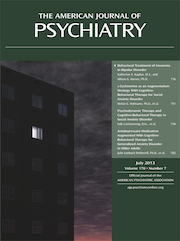T
o the E
ditor: In their recent meta-analysis of nonpharmacological interventions for attention deficit hyperactivity disorder (ADHD), Sonuga-Barke et al. (
1) concluded that limited evidence is available for behavioral interventions. We raise a number of key issues for consideration with respect to this conclusion.
Most importantly, ADHD symptoms were the primary outcome measure in this meta-analysis. Across disorders, however, functional impairment is what prompts treatment seeking, and reducing impairment is the desired outcome (
2). ADHD symptom reduction does not necessarily equate to improvements in functioning (
3); impairment is therefore a far more socially valid outcome than psychiatric symptoms per se. For behavioral interventions, the primary target of treatment has historically been impairment. For example, dysfunctional parent-child interactions as evaluated by blinded observational assessments determine larger effects on ADHD symptoms in parent training studies (
4) and predict serious developmental outcomes for children with ADHD (
5). ADHD symptoms are therefore by no means considered the only (and certainly not the most clinically important) target of treatment.
Additionally, the behavioral intervention studies included in this meta-analysis constitute only a small fraction of the larger treatment literature (
4). Furthermore, combining diverse nonpharmacological interventions into a “behavioral intervention category” may grossly undermine the estimated effects of behavioral interventions. For instance, interventions such as direct child therapy and social skills training have little to no empirical evidence, whereas behavioral parent training and behavioral classroom interventions are well-established treatments (
6). The approach taken by Sonuga-Barke et al. is analogous to a meta-analysis of pharmacological treatments for ADHD that combines stimulants, antidepressants, and atypical antipsychotics as a single category of “stimulant medications.”
A key issue highlighted in this article is the need to include active treatment comparison conditions to obtain objective evaluations of treatment outcomes, which we fully support. Unfortunately, the approach taken by the authors often involved evaluating teacher ratings after home interventions, parent ratings after school interventions, or brief laboratory or clinic observations of the child’s ADHD symptoms. Behavioral treatments demonstrate the largest effects in the setting in which they are implemented (
6), and blinded assessments of behavior in these settings will likely yield a more valid evaluation of treatment effects.
We hope that this article encourages an investment in more rigorously designed outcome studies, but we have concerns about the potential implications of this meta-analysis despite more than 40 years of solid evidence for the efficacy of behavioral interventions.

